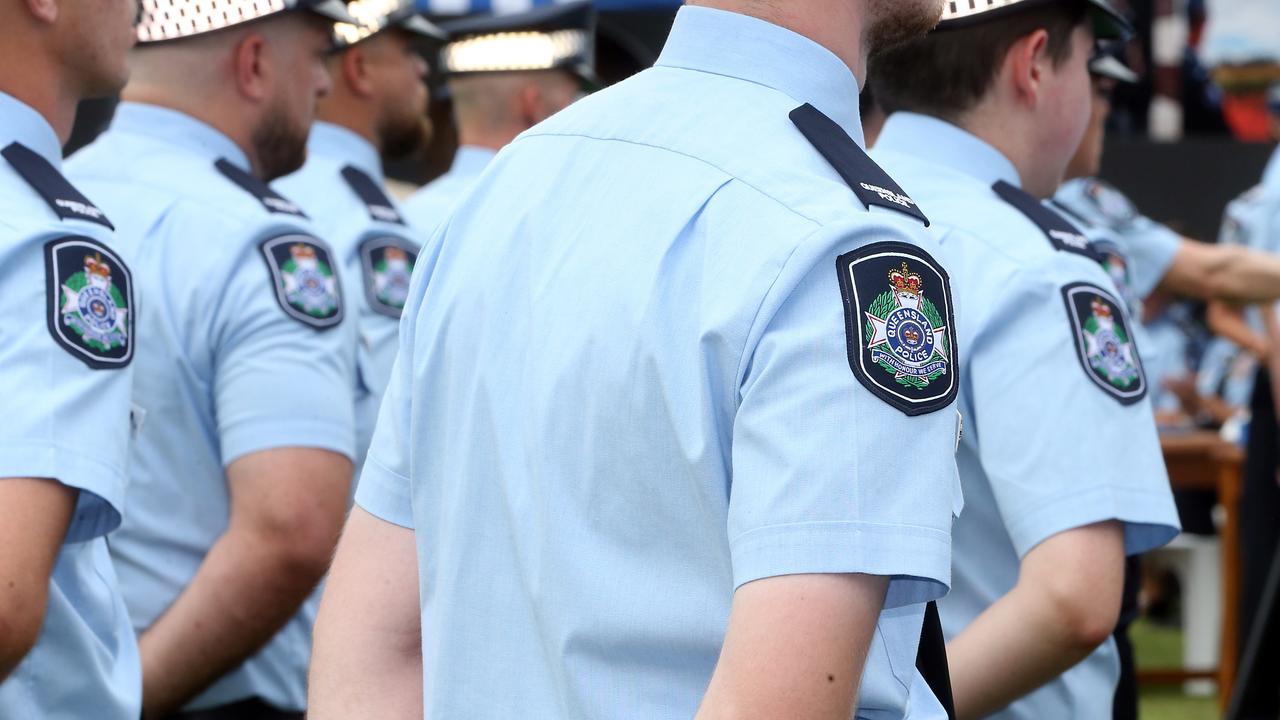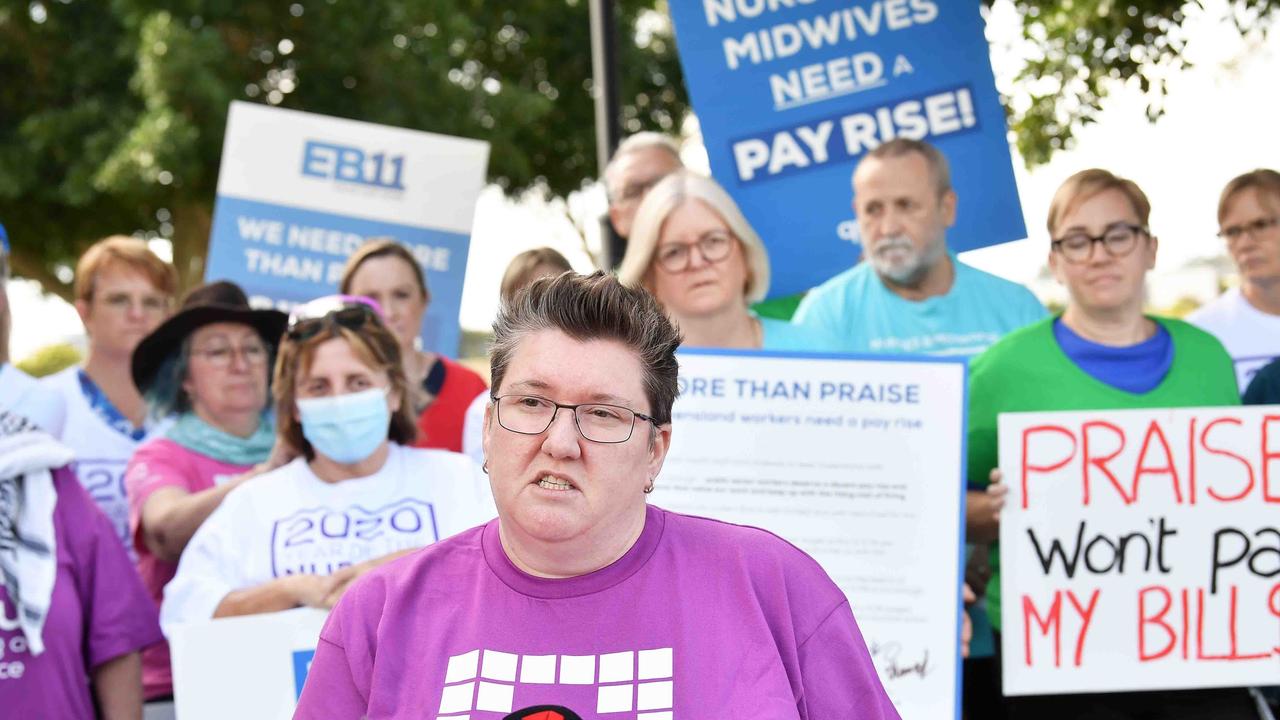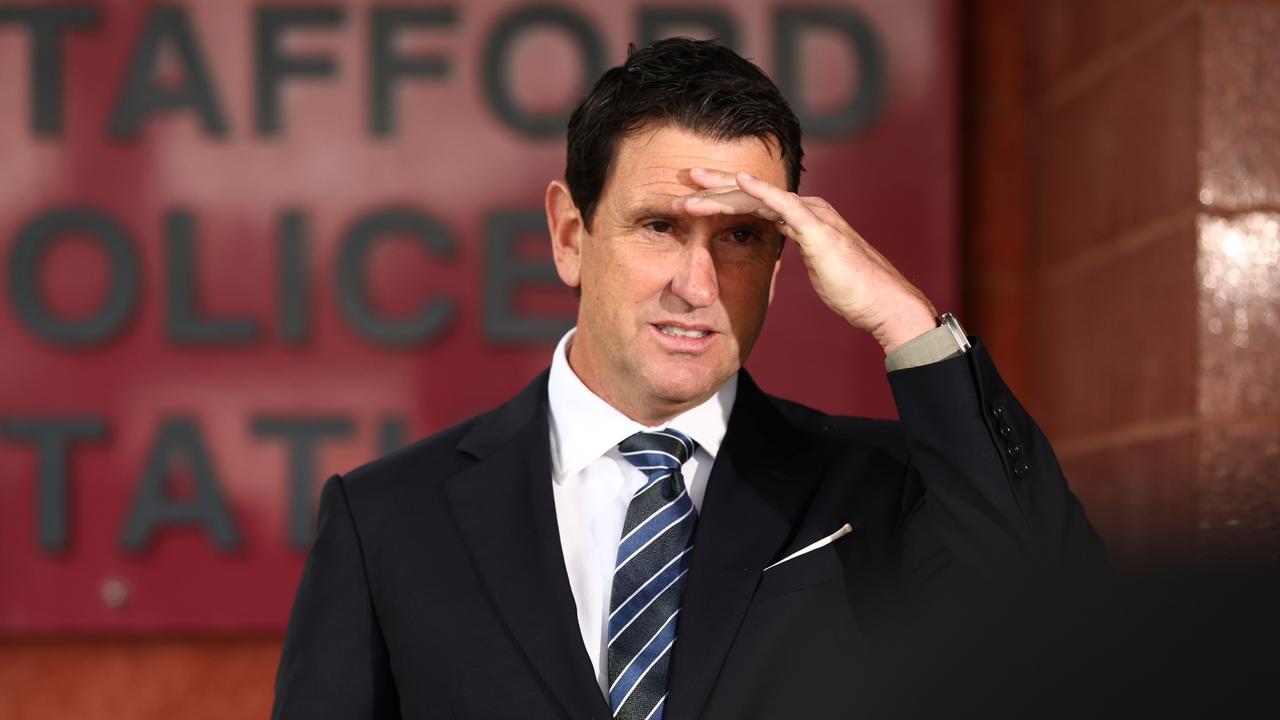Nurses ready to strike as police seek pay rise three times higher than frontline health workers
Tens of thousands of nurses and midwives across the state have voted to strike despite threats over back pay, as police seek a pay rise three times higher than that offered to nurses.

QLD News
Don't miss out on the headlines from QLD News. Followed categories will be added to My News.
Tens of thousands of nurses and midwives across the state have voted to strike, as police seek a jaw-dropping pay rise three times higher than what frontline health workers have been offered.
More than 96 per cent of Queensland Nurses and Midwives’ Union members on Monday night voted to undertake Protected Industrial Action following threats from Queensland Health to withhold eight weeks’ backpay if they moved to strike.
Pay negotiations between the government and the QNMU act as a foundation for all police, firefighters and teacher wage negotiations later this year, with police wage contracts due to expire next in June.
QNMU secretary Sarah Beaman said the strong vote reflected widespread burnout, chronic understaffing and declining conditions.

“I commend Queensland’s frontline public nurses and midwives for their collective courage in standing up to threats on behalf of Queenslanders and their colleagues,” she said.
“(It) has seen Queensland Health officials go from “a subsequent offer is not forthcoming,” to a “revised offer” in less than a week.
“However, under this offer there are still too many unanswered questions and missing commitments.”
Queensland Health revised its EB12 offer this week to include increased overtime rates paid to continuous shift workers and the introduction of a permanent night shift.
It did not include a higher wage offer.
The union’s 55,000 members are now preparing to strike across Queensland hospitals.
Ms Beaman called the overwhelming support from members to strike as unprecedented.
“The striking action that they (nurses and midwives) want to take, I think, and the vote yes to take strike action really indicates a level of anger, they are angry at a commitment that they see as not being fulfilled, on top of the fact of a government that is trying to erode conditions and entitlements,” Ms Beaman said.
She said strike action could begin as early as next week, however it may mean starting small such as wearing union T-shirts, rather than downing the tools straight away.
“I know nurses and midwives absolutely want to walk out of wards at this point, there is a huge proportion that do, we do need to start at the level where we are having conversations, it’s about shifting the public opinion that then shifts the government’s focus.”
The union must give Queensland Health 72 hours notice before starting any strike action and Ms Beaman said patient safety remained a priority.
This will be the first time Queensland nurses and midwives have taken industrial action since Peter Beattie was premier in 2002.
Queensland Health director-general David Rosengren said he believed the offer was generous and reflected how much the department valued the commitment and dedication of nurses and midwives.
“The offer is underpinned by a minimum 11 per cent wage increase over three years – which includes a 5.5 per cent increase in the final year – and an inflation adjustment allowance to help nurses and midwives keep pace with cost of living,” Dr Rosengren said.
“This offer will ensure Queensland’s public sector nurses and midwives will receive the best wages and conditions in the country across the life of the offer...
“In an Australian-first, Queensland Health’s offer will also ensure continuous shift workers receive double-time overtime rates.
“This is a game changer for our nurses and midwives by aligning overtime rates with other Queensland government agencies to help reduce gender pay disparities across the public sector.”
Health Minister Tim Nicholls has maintained that with the addition of the 3 per cent sweetener at the end of the agreement the state’s nurses and midwives would meet nation-leading wages, but Ms Beaman said this wasn’t the case for all staff.
“That additional 3 per cent at the first of December, 2027 does not get the majority of nurses and midwives as nation leading, some classifications absolutely will be, but the overwhelming majority, 66 per cent will not be nation leading,” she said.
Ms Beaman claimed other conditions overlooked in negotiations included reducing nurses in health practitioner roles within mental health and aged care assessment teams.
“They’re wanting to erode that position, which would actually have those nurses have their income reduced by $60,000 over the course of EB12, so on top of not getting conditions and allowances that would increase nursing numbers, retain nursing numbers, they are actually eroding the pay,” she said.
The union has now lodged the paperwork in the Queensland Industrial Relations Commission to seek permission to take industrial action.
Meanwhile, the Queensland Police Union has tabled a bold wage claim seeking 8 per cent annual pay increases from 2025 to 2027 — far above the government’s current 3 per cent offer.
If the wage increase is met by the government, police would be offered a wage increase more than three times higher than nurses and midwives.
Police Minister Dan Purdie did not respond to questions over whether he would back an 8 per cent annual pay rise.

A spokeswoman for his office said wage negotiations were ongoing.
“The Minister has consistently affirmed his commitment to negotiating in good faith,” she said.
“Discussions between the Queensland Police Service and the relevant unions remain ongoing.”
The police log of claims also proposes a sweeping restructure of pay points, expanded allowances for high-risk units, double-time overtime, improved leave entitlements and incentives for regional officers.
The current wage offer for both nurses and police is 3 per cent in 2025 and 2.5 per cent the following two years.
The QNMU is seeking a meeting with Queensland Health this week to seek clarification on many aspects of the latest EB12 offer.
It comes after the government last week sent an email to the QNMU confirming a higher wage offer was no longer possible as it did not coincide with the commitment “respect taxpayers’ money”.
Premier David Crisafulli said he was still confident an agreement would be reached with the QNMU.
“I back nurses,” he said.
“The minister is working in good faith, the union has been good to deal with, and I’m very confident we can get a deal.
“We are serious about giving them nation leading wages and conditions.
“And I have every faith that will be able to deal with that and be able to come to an agreement that shows the respect we have for nurses.”
More Coverage
Originally published as Nurses ready to strike as police seek pay rise three times higher than frontline health workers








